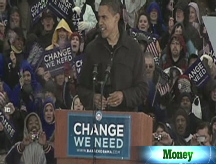Stocks: New president, same problems
Investment experts say that despite Barack Obama's convincing win, the market volatility isn't over yet.
NEW YORK (CNNMoney.com) -- Will there be an Obama market rally?
Even factoring in the more than 5% drubbing the Dow took Wednesday following yesterday's big Election Day rally, the Dow is up about 12% since Oct. 27, when it closed at a more than 5-year low.
Some market watchers have chalked up the recent gains to a realization that the presidential campaign was finally drawing to a close and that it was looking as if there would be a clear winner.
Wall Street, as the old axiom goes, hates uncertainty. And Barack Obama's convincing victory Tuesday erased any lingering doubts about what Americans wanted from their next president.
In fact, many people I spoke to last week suggested that Obama's lead in the polls was due to the notion that he, and not John Mc Cain, had a better plan to get the economy out of this funk.
"The people have spoken and it's wonderful that the Supreme Court didn't have to decide the election. Obama has a pretty clear mandate," said Phil Dow, director of equity strategy for RBC Capital Markets in Minneapolis.
But as investors now begin to focus on the immense challenges that President-elect Obama will face, Dow and other market observers caution it's too soon to say that the worst is over for stocks.
"None of the problems have gone away. The economic numbers are still awful," Dow said.
With that in mind, Wall Street is eagerly awaiting an announcement from Obama about who he will nominate to be Treasury Secretary. This is a critical decision given that the Treasury Department is overseeing the $700 billion bank bailout.
"The key for the markets is who Obama selects as Treasury Secretary," said James Shelton, chief investment officer of Kanaly Trust Company in Houston, which manages about $2 billion for high net-worth clients.
There has been a lot of speculation about who Obama might name to this Cabinet position, including current New Jersey governor and former Goldman Sachs (GS, Fortune 500) CEO Jon Corzine as well as JPMorgan Chase (JPM, Fortune 500) CEO Jamie Dimon.
But Shelton said he thinks that investors would be in most favor of New York Federal Reserve president Tim Geithner, who has been the Fed's point-person in dealing with the wreckage on Wall Street.
"Geithner's name has been thrown around and he would be a good choice. The markets would approve," Shelton said. "It's critical that it's someone who truly appreciates the complexities of the current financial system and think many would prefer Tim Geithner over a CEO."
Doug Roberts, chef investment strategist with ChannelCapitalResearch.com, an investment firm based in Shrewsbury, N.J., also said that Geithner would likely be warmly received by Wall Street.
"The biggest thing Obama needs to do right now is put an economic team in place. And for Treasury Secretary what investors are looking for is stability --somebody who's been active during the crisis and has been a tested person," Roberts said.
He added that it will be key for Obama to choose someone that can do a better job than current Treasury Secretary Henry Paulson did in terms of explaining the credit crisis and bank bailout plan to both Congress and voters.
"Paulson's problem is that communication is not one of his strong points," Roberts said.
Nonetheless, even if Obama's selection for Treasury Secretary wins raves from investors and quick approval by Congress, that probably won't be enough to end some of the gut-wrenching churns that have plagued the markets for the past few months.
"The markets will continue to be volatile although probably not as volatile as in the past. The bottom will probably be tested again," said Bob Baur, chief global economist with Principal Global Investors in Des Moines, Iowa.
Simply put, there are many things beyond Obama's control that will affect the markets between now and Inauguration Day.
More bad news is on the way, particularly once companies report their next round of quarterly results in early-to-mid January. Many of them may warn in December that they won't be able to meet forecasts.
"Investors are trying to figure out what earnings are going to be like and estimates are probably still too high for the fourth quarter and 2009," said Dow. "The volatility is not over. The up moves have been tentative and there has not been any real conviction yet."
Of course, this doesn't mean that the markets are necessarily doomed for a dismal 2009.
Most of the people I spoke to suggested that the combination of attractive valuations and a hope that the various initiatives already put in place by the Treasury Department and Federal Reserve will eventually help lead to a recovery in the credit markets, stocks and broader economy.
So in some respects, Obama's most important task may be just to make sure that his economic team continues the work that has already been started. That could be enough to eventually get stocks back on track.
"The new administration has to do no harm. The Obama team and Paulson team will work closely together," Baur said. "So to some extent, Obama may be very lucky. Ultimately, there could be a rally as long as confidence is restored in the markets."
Did you vote for Obama? How do you think the new president will affect your wallet? What do you think Obama needs to do to fix the economy - both in the short run and the long term? What should be first on the new Congress's agenda? E-mail us your thoughts, including your name, photo and contact info; the best answers will be featured in an upcoming CNNMoney.com article. ![]()



